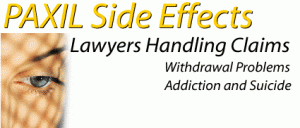Paxil Side Effects
Side Effects of…..
Paxil 20MG and Paxil 10Mg
Before listing Paxil’s side effects, we need to understand what Paxil is for and who can use it for treatment.
Paxil is an SSRI (selective serotonin reuptake inhibitor). Serotonin is that chemical that helps nerve cells to communicate messages between one another. When nerve cells are halted to communicate, it results to mental and psychological problems. Because of serotonin, the main component of Paxil, this drug helps in mental and emotional conditions, allowing in the treatment of disorders like depression and PTSD.
Paxil is considered to be the most effective treatment for generalized anxiety disorders, depression, obsessive-compulsive disorder (OCD), premenstrual dysphoric disorder (PMDD), social phobia or social anxiety, panic disorder and post-traumatic stress disorder (PTSD). In recent years, Paxil is used to treat dementia, alcoholism, obsessive gambling, hot flushes and even fight obesity. Paxil is known to be fifth most prescribed antidepressant in the United States amounting to over $1 billion in sales by 2007.
It is widely concluded that Paxil is an effective treatment to combat depression in adults. Patients taking it were reported to have lessened symptoms of depression after the second week of use. Paxil has successfully treated seventy-five percent of users with generalized anxiety disorder and is the most prescribed antidepressant because it is an extremely effective treatment for many brain related disorders. Paxil is taken to treat real depression, not just ordinary sadness.
When it comes to treating depression, reuptake blocking like what Paxil does is highly beneficial for some people. There were many reports that reveal how it is very effective in alleviating depression symptoms. Paxil is also known to prevent relapse, which is very good news to people beset with this condition for years.
Like any other psychoactive drug in the market, Paxil has side effects and can cause withdrawal symptoms. It was reported, however, that the Paxil side effects are not severe enough to overshadow its effectiveness in combating brain related disorders. Treating depression is one of the most problematic and sometimes highly coincidental in the field of psychological medicine.
Since the moment GlaxoSmithKline (GSK) manufactured and distributed Paxil and other SSRIs, controversies, lawsuits and investigative studies were all over the place. Throughout the more than a decade since it was launched, Paxil has been observed as the most effective and highly prescribed antidepressant in the United States. GlaxoSmithKline (GSK) has marketed Paxil as non-habit forming but was later on countered by the court and experts. The International Federation of Pharmaceutical Manufacturers Association said that GlaxoSmithKline (GSK) has misled the consumers about the real deal regarding Paxil or paroxetine.
The head of Social Audit, Charles Medawar, was quoted on the British Medical Journal saying, “This drug has been promoted for years as safe and easy to discontinue . . . The fact that it can cause intolerable withdrawal symptoms of the kind that could lead to dependence is enormously important to patients, doctors, investors and the company.”
General negative side effects can manifest during the first 1 to 4 weeks of treatment, when the body is trying to acclimatize with it. Side effects are common and sometimes can be limited to special cases such as in pregnancies, misusing or overdosing on Paxil.
Side effects can also be triggered through allergic reactions that are dosage-controlled and administered by a doctor. Allergic reactions to Paxil can range from hives, skin rashes, difficulty in breathing, headaches and facial swelling. It can cause adverse reactions like dizziness, insomnia, kidney and liver problems, vertigo, blood clotting disorders, constipation, diarrhea, vomiting, jerking movements, nausea and bleeding problems. Paxil can also cause sweating, high blood pressure, weight gain, mood swings, long-term memory loss, agitation, asthenia, paresthesia (burning, prickling, tingling and numbing sensation of a person’s skin), activation syndrome and akathisia (restlessness).
The most common Paxil side effect would be sexual dysfunction. It was reported that SSRI antidepressants can make both males and females to have difficulty in becoming aroused, have troubles in achieving orgasm (anorgasmia) and have lack of interest in sex. Paxil side effects also cause a male’s sperm to have DNA fragmentation (sperm death). Taking Paxil is like genital anaesthesia, which decreases a person’s response to sexual stimuli. This condition makes ejaculatory anhedonia possible.
Females taking Paxil that suddenly become pregnant can face a very big problem. Expectant mothers can cause their newborn child to have severe heart defects and lung problems. Paxil can also be carried over to the nursing child through the mother’s breast milk. Sudden discontinuation in taking Paxil without the doctor or physician’s recommendation may provoke a relapse or make things worse for the patient. Expectant mothers must consult their physicians or doctors before taking the necessary steps to alleviate problems that will later on manifest onto their children. For pregnant women taking Paxil, withdrawal symptoms can manifest that include convulsions in newborn children.
Mania or hypomania and long-term memory loss can also be an adverse effect of Paxil. For people with no history of mania in the family, this side effect can manifest after taking Paxil. For those with history of bipolar and mania in the family, Paxil may trigger a likelihood of these side effects to occur.
According to reports, it is shown that Paxil has one of the highest incidents of severe withdrawal syndromes. Among the symptoms that manifested during the withdrawal/discontinuation syndrome from Paxil is somnolence or dizziness, nausea, vertigo or lightheadedness, anxiety, illogical crying, insomnia, nightmares or vivid dreams.
Higher risk of suicidal tendencies can manifest when people under the age of 18 takes Paxil. Sometimes, the cause of suicide can be purely coincidental. However, the US FDA (Food and Drug Administration) conducted an analytic study comparing the effect of Paxil to placebos in certain conditions. It was observed that there’s an increase of “suicidality” in patients with depression and anxiety disorders taking Paxil.
The list of Paxil’s side effects may be long, but the solution isn’t merely to stop the medication. It is imperative that people taking Paxil should consult a doctor first before stopping to avoid any occurrence of a relapse after.
Discontinued use of Paxil can cause a rebound effect with exaggerated symptoms that can take long periods of time to overcome. These side effects can last for months or even years after discontinuing using Paxil.
It is a well-known fact that Paxil’s side effects differ from one person to another. Some experience a few and some all. There are few who experience side effects that are not listed yet.
Most side effects are dose-dependent and therefore can be prevented by lowering dosages of Paxil based on the doctor’s advice.
To learn more about Paxil Click Here








